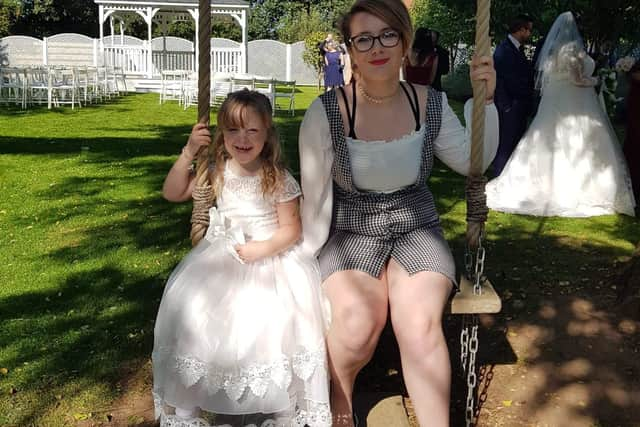Chesterfield mum-of-two struggles with the loss of £86 a month from Universal Credit uplift


When Maria left her job at Auto Windscreens to pursue her dream of becoming a midwife, little did she imagine years down the line she’d be unable to work and struggling on benefits with two kids.
Now aged 39, she has been dreading the day her Universal Credit drops by £86.
Advertisement
Hide AdAdvertisement
Hide AdFollowing the cut, Maria’s payment reduces to £1,720 a month, which is broken down as follows –


£450 for rent, in replacement of housing benefit £317 allowance £500 for her children, in replacement of child benefit £129 for disability care £320 for limited capacity to work
She’s currently looking at using less fuel and canceling subscriptions in order to make up for the shortfall.
Maria is also trying to cut her food bills, however this is difficult as her nine-year-old daughter Sofia suffers from eosinophilic esophagitis and needs a special diet excluding dairy, wheat and gluten, which often has to be sourced from more expensive shops.
Advertisement
Hide AdAdvertisement
Hide Ad“It’s difficult to get ‘free from’ food from places like Aldi and Lidl, so I’m limited to places like Tesco and Morrisons,” she says.
She had to leave her midwifery studies when she fell pregnant with her eldest daughter Jessica, now 15.
Maria went back to work after having her first child, however when Sofia was born, it became clear at an early stage that she suffered from disabilities.
“There were problems right from the day she was born,” Maria recalls.
Advertisement
Hide AdAdvertisement
Hide Ad“She was in and out of hospital from being four months of age and she was referred to see a pediatrician from 11 months.
“She was diagnosed with several developmental delays.”
Sofia has since been diagnosed with ADHD, autism and pathological demand avoidance, which means she can be difficult to give directions to.
“She’s on a whole other level,” Maria explains. “You don’t just ask her to do something. You’ve got to have a half an hour battle with her to do something that will take her a couple of minutes.”
Dealing with her daughter’s disabilities is one thing, but Maria has numerous conditions herself that severely affect her day to day life, including depression, fibromyalgia, ME, pancreatitus, osteoarthritis, chronic asthma and autism.
Advertisement
Hide AdAdvertisement
Hide Ad“I tried going back to work a few years back before my health worsened, but it was quite difficult,” she says.
Her daughter’s condition is such that she needs a stable routine, which the shifts she was working didn’t help with. This added to Maria’s own ill health made returning to work impossible.
When the Government first introduced the uplift at the start of the Covid pandemic Maria was grateful for the helping hand.
“They seemed to be helping people out with work, with the furlough scheme, and it’s nice that they were helping people who were not working or on low income,” she says.
Advertisement
Hide AdAdvertisement
Hide AdMaria put the extra cash towards the cost of travel to and from medical appointments for both her and Sofia, as well as the increased cost of food during the pandemic.
“I was getting food delivered, but a lot of the time there is a minimum spend required for that, and you have to pay for deliveries as well,” she says.
Maria’s chronic asthma means she is more vulnerable to Coronavirus and has therefore had to be especially careful over the past 18 months.
She was always aware the uplift was temporary, but questioned why the Government ceased it only two months before Christmas.
Advertisement
Hide AdAdvertisement
Hide Ad“£86 is a lot of money. It’s a weekly shop for me,” she says.
She added that she thought it would have been better to give people until January before stopping the extra payment, to help them prepare for it more.
Maria said people who believed the Universal Credit payment should be scrapped had the ‘wrong attitude’.
“They’re all going to need some help at some point from the Government,” she concludes.
“I would work if I could, but I can’t. I really need the help from Universal Credit. I can’t manage if that changes.”